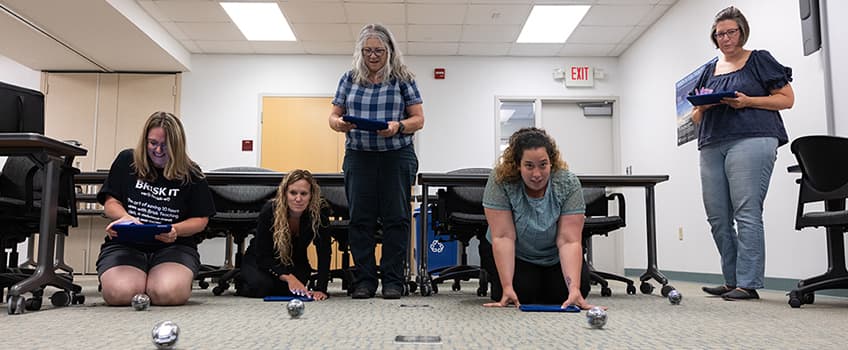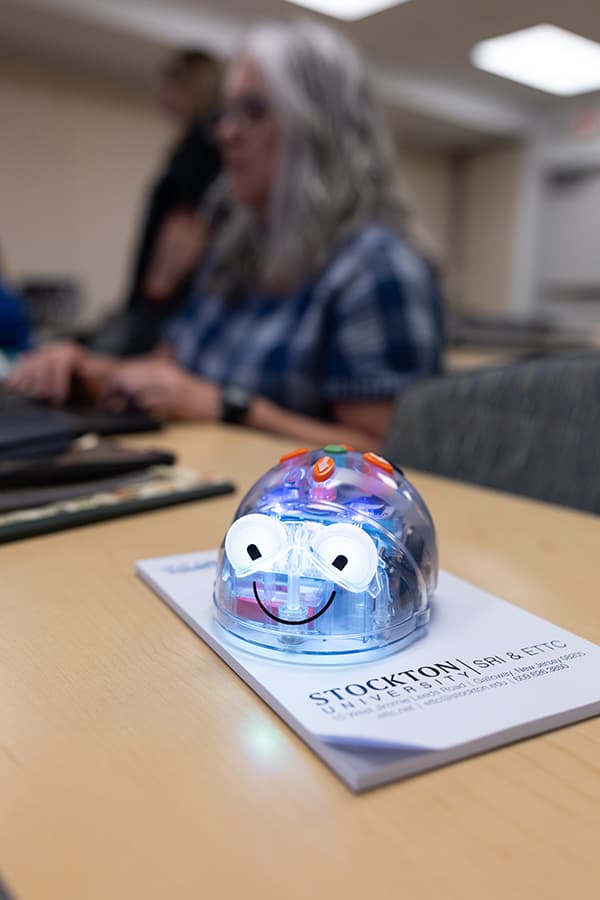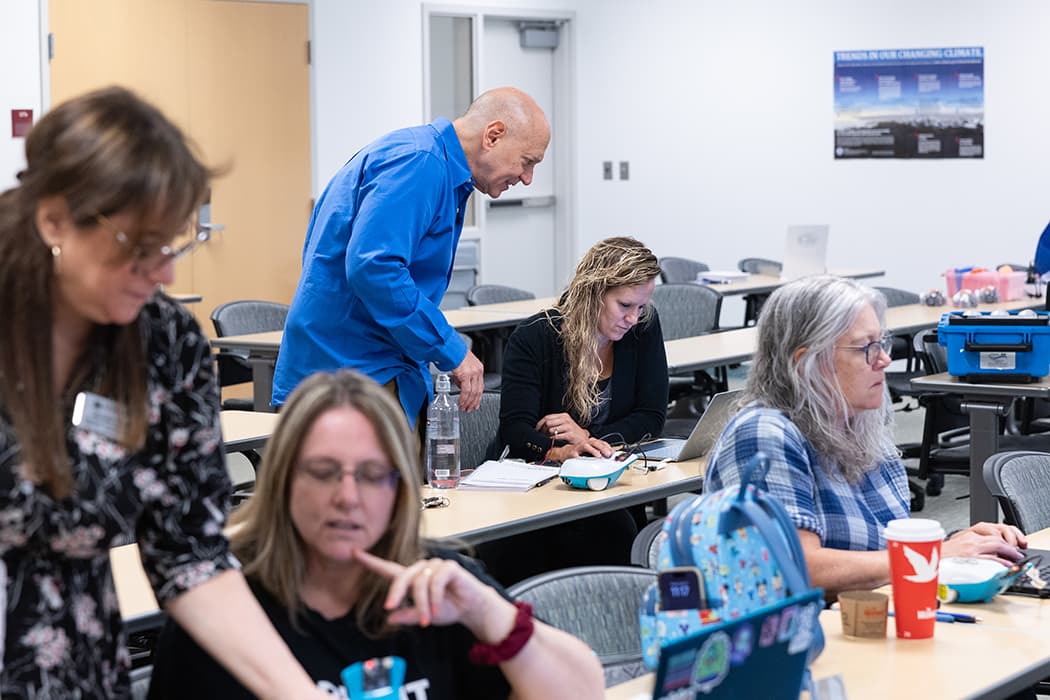$280,000 State Grant Brings AI, Robots into K-12 Classrooms

From left, teachers Gerilyn Williams, Courtney Wescott, Dawn Payne, Melissa Gomez and Christine Stanford test their robots after programming them during a Computer Science Coastal Hub workshop at the Southern Regional Institute and Educational Technology Training Center.
Galloway, N.J. — Patty Weeks remembered when computers were first brought into K-12 classrooms three decades ago.
“I was probably one of the first people to even get a computer at Stockton,” said Weeks, who has worked to educate teachers for nearly 30 years as the director of the university’s Southern Regional Institute and Educational Technology Training Center (SRI & ETTC). “There was so much anxiety. Teachers were saying, ‘I’m going to lose my job if I don’t learn how to do this.’ ”

Several of the workshops cover how to train and program Bluebots.
Today, Weeks notices similar sentiments among teachers with the emergence of artificial intelligence.
“There’s a lot of fear about AI now and trying to educate the educators about how AI can be positive,” she said. “These are the tools they will be using in their future.”
Workshops on how to integrate AI into a classroom are part of the Computer Science Coastal Hub at the SRI & ETTC, which was created three years ago with funding from the New Jersey Department of Education. Earlier this year, Stockton received a $280,000 grant to continue to train teachers on the implementation of mandatory state computer science standards. The state has awarded more than $1.5 million to Stockton’s hub since 2022 and more than 800 teachers have taken part in free computer science workshops, Weeks said.
Several of the workshops this summer included topics such as data visualization, coding with drones and game design. Elementary school teachers Joann Case and Deepa McCabe are regular attendees of the Stockton workshops, and they were both excited when one on AI and machine learning was offered this summer.
“I work with really young students who are going to be impacted by AI for the rest of their lives,” said Case, a K-4 technology teacher at Endeavor Elementary School at Joint Base McGuire-Dix-Lakehurst. “I wanted to see how I can make that relatable to an early elementary student. How can they get a base of understanding of it? What is machine learning? How can AI impact their future? Basically, what is it? They may have preconceived notions of what it is.”
McCabe sees the potential for positive uses of AI in the world.
“I think that teaching students how to be the creators of the tech that has positive uses, rather that just consumers, helps them understand it more and where it could go wrong,” said the computer science teacher and librarian in the Ocean City School District.
But as a parent to high-school aged children, she also has seen some of the dangers of students just using AI as a shortcut to get schoolwork done.
“I’ve definitely had concerns as a parent,” she said.
One of the workshop’s most interesting lessons didn’t even use a computer. The “unplugged” exercise simulated how AI machines learn. One teacher would train another teacher acting as AI on how to recognize the difference between shapes and animals.
One teacher would show the other a flash card of either an animal or a fruit. The teacher acting as AI would then have to place the card in one of those two categories.

Instructors Phillip Polsinelli, right, and Michelle Wendt work with a group of teachers during a robotics workshop.
“But sometimes you were given an example that wasn’t a shape or an animal, and you still had to put it one of those two categories,” McCabe said. “When you do an example like that with kids, it makes them start to understand that AI is going to give you an answer, even if it’s the wrong answer. Its answer is only based on the data that has already been provided to it.”
In addition to the free workshops, the hub also offers lesson plans for teachers, the opportunity to network and get ideas from peers and a free lending library offering tools for all ages, such as programmable robots, Chromebook tablets and books on coding.
“We use the grant money to make sure we remove as many of those barriers or stumbling blocks that teachers might encounter,” said Michelle Wendt, the AI workshop instructor. “We are trying to make sure that regular teachers, not just STEM-themed teachers, have the skills, resources and support to meet the computer science standards.”
Teaching computer science can be intimidating for many classroom teachers, many of whom didn’t receive any training in it when they went to school.
“We want to make sure everybody walks away with something that would make them feel more comfortable and more supported in bringing computer science to every student,” Wendt said.
McCabe, who also teaches a game design workshop at the SRI & ETTC, believes the true path to equitable access to computer science is through the classroom teachers.
“This Stockton program is filling the gaps and helping to empower classroom teachers,” she said. “It kind of taking the scary and unknown away.”
For Case, attending the workshops are all about trying to stay current.
This Stockton program is filling the gaps and helping to empower classroom teachers. It kind of taking the scary and unknown away.”Deepa McCabe, elementary school teacher and librarian in Ocean City School District
“That’s my biggest goal with my students: I want them to see themselves as the programmers of the future.”
Learn more about the Coastal Hub for Computer Science by visiting the program’s website and see a schedule of upcoming events. For questions or more information send Patty Weeks an email.
The SRI & ETTC at Stockton University is one of the premier professional development programs in the state. Nearly 10,000 educators participate in its programs and activities each year in topics that include technology integration, core curriculum, instructional strategies, school leadership, special education and social and emotional learning.
— Story by Mark Melhorn, photos by Susan Allen


